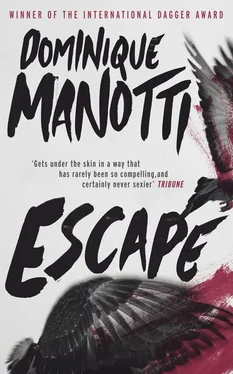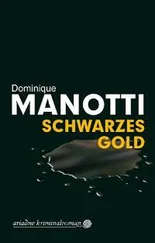Dominique Manotti - Escape
Здесь есть возможность читать онлайн «Dominique Manotti - Escape» весь текст электронной книги совершенно бесплатно (целиком полную версию без сокращений). В некоторых случаях можно слушать аудио, скачать через торрент в формате fb2 и присутствует краткое содержание. Год выпуска: 2014, ISBN: 2014, Издательство: Arcadia Books Limited, Жанр: Криминальный детектив, на английском языке. Описание произведения, (предисловие) а так же отзывы посетителей доступны на портале библиотеки ЛибКат.
- Название:Escape
- Автор:
- Издательство:Arcadia Books Limited
- Жанр:
- Год:2014
- ISBN:9781909807747
- Рейтинг книги:4 / 5. Голосов: 1
-
Избранное:Добавить в избранное
- Отзывы:
-
Ваша оценка:
- 80
- 1
- 2
- 3
- 4
- 5
Escape: краткое содержание, описание и аннотация
Предлагаем к чтению аннотацию, описание, краткое содержание или предисловие (зависит от того, что написал сам автор книги «Escape»). Если вы не нашли необходимую информацию о книге — напишите в комментариях, мы постараемся отыскать её.
Escape — читать онлайн бесплатно полную книгу (весь текст) целиком
Ниже представлен текст книги, разбитый по страницам. Система сохранения места последней прочитанной страницы, позволяет с удобством читать онлайн бесплатно книгу «Escape», без необходимости каждый раз заново искать на чём Вы остановились. Поставьте закладку, и сможете в любой момент перейти на страницу, на которой закончили чтение.
Интервал:
Закладка:
We met up in a café a few hundred metres from the bank. Carlo had brought the guns in a sports holdall, we took one each. At 14.30, we got into our vans, Carlo alone in one, Pepe and me in the other. At 14.50, Pepe started up the van and parked it over a driveway to the left of the bank, obstructing the entire pavement. The bike was there, shielded by the van, and I was relieved to see it. At 14.57, the security van drew up in front of the bank and two guards got out, one of them was carrying two bags, the other kept his hand on his hip, on his open holster, and they went into the bank. Just then, Carlo’s van pulled up on the driveway to the right of the bank, facing ours. I was very focused, but not frantic, not even anxious; we simply needed to stick to the plan. Carlo opened his door, I opened mine. I didn’t take my eyes off him, he was our chief, we took our cue from him. He had his gun in his hand, I picked up mine, but then everything went wrong, and I don’t understand how or why. I saw Carlo collapse in slow motion, like in a film. It was impossible, unthinkable, and I lost all sense of reality. I was in another dimension. I’d gone deaf, I couldn’t hear a sound, I didn’t hear the shots. I turned towards the entrance to the bank, still in slow motion, and I saw a carabiniere aiming his gun at me, and one of the security guards taking his gun out extremely slowly. I didn’t have the sense that I was in danger, I shot without making the decision to do so, without grasping what was happening. I saw two cops stagger and fall in a muffled silence. I existed only through the gun I was holding with both hands, through my fingers squeezing the trigger. Pepe grabbed me by the arm, brutally, and dragged me from the scene. He shoved me behind the van and started up the bike. I clambered on behind him, clung on to his shoulders, and within a few seconds we were out of sight. I could feel the bike throbbing, I could hear the sound of the engine, I put my gun in my pocket and I could feel the barrel burning my thigh. Gradually I came back down to earth. I replayed the whole scene in my mind, much more clearly than I had experienced it. Three things were certain: Carlo was dead. Dead. I would never hear him talking about his former battles again, inventing his future and mine. Dead without a goodbye, a last outburst, a last caress. Another certainty: I had killed, I’d become a killer, without yet comprehending the full import of those words, the consequences of those actions. And finally: yes, Carlo was right, they’d been waiting for us.
Filippo adds these sheets to those in the orange binder sitting on the desk in front of him. He is concentrating, his elbows on the desk, his face cupped in his hands. The two key sections of his story, the opening and the closing scenes, are written, they exist. His task now is to fill in the bits in between, bring alive the entire story by fleshing it out. How to go about it?
He draws a box in the top left-hand corner of a blank sheet of paper, and writes ‘Escape’ in it. In the bottom right-hand corner, a box with ‘Bank raid’. Three weeks to get from one to the other. Three characters, Carlo, Marco, Luciana, and a fourth, Filippo, the chronicler, slightly in the background, an observer until the final shootout. He scribbles and he thinks. When he feels that he has a scene where something is really happening between the four of them, he gives it a name, a number, and hangs it on the line between the breakout and the bank robbery. Sometimes, he moves a box up or down the line, inserts another. At first, the game amuses him, but soon he is hooked. It is not long before he has the bare bones of his entire story:
After the breakout, the two fugitives and Luciana made it to a ruined farmhouse in the mountains. Marco, the small-time boss from Rome, was waiting for them there. He’d thought of everything, organised everything to enable them to hide out and survive — clothes, food and a few books for Carlo, who appreciated his thoughtfulness. But Marco never did anything for free. He immediately informed them that he had big plans. He wanted to expand his gang and consolidate his territory in Rome. To do that, he’d already done a deal with the local mafia bosses. He needed competent, reliable men, men he could count on, like Carlo and Filippo. Carlo was hesitant and asked for some time to think about it before making a decision. Marco reluctantly agreed, gave Carlo a week and went back to Rome. Luciana stayed at the barn and became Carlo’s mistress. Filippo accepted this situation, which he’d known was inevitable ever since they’d first met in the car park. If he was annoyed with Luciana, it was for depriving him of precious moments of intimacy with Carlo rather than for being unfaithful to him. Carlo got back in contact with his Milan friends, those who weren’t dead or in jail. To survive, they formed a little band of thieves and lived off run-of-the-mill burglaries, while cultivating the memory of ‘the years of fire’.
Carlo trusted former comrades rather than anyone else. He was keen to hold on to his independence, and was instinctively wary of Marco. He suggested that the Milanese should build a solid team, that they should stop being amateurs and move up a gear — first of all, do a bank robbery, in the style of the best of them in the old days. Then, they’d see, they’d have money, the means to plan for the future. The idea soon took shape. The bank was selected, the plans for the raid drawn up. All the logistics were entrusted to the Milan crew. Carlo would head the action group. He came back to the farmhouse with Pepe, one of the Milanese. Filippo, who’d been a pickpocket and bag-snatcher, let himself be sucked in, fascinated by Carlo’s eloquent tales of past exploits and his future plans. He would be the third man. Preparations for the robbery were steaming ahead. Marco felt he was losing control of the group and his grand plans were compromised. However, he did seem willing to make a deal: in exchange for his past help, he insisted that the first bank raid take place in Rome, on his turf, so that he could control the share-out. Carlo refused; he insisted on Milan, his home town, on his turf. Neither trusted the other. Besides, claimed Carlo, plans were too far advanced in the north now to change targets. Conflict.
Filippo delights in imagining the clash between the two men, he knows he’ll enjoy writing it even more. Carlo, tall, slim, elegant, classy, icily polite, with perfect self-control. Then Marco, squat, burly, a square mug, deep-set eyes and very black, bushy eyebrows in a slash across his forehead, a scar down his left cheek that disfigures his face slightly — a souvenir of knife fights in the turf wars around Termini station — his thuggish manner and brutal gestures. A persistent memory — the mug of the getaway car driver. Filippo counts on writing to help him purge the fear he felt on meeting his gaze, back in the mountains.
Class won out over violence. At least for the time being. Marco seemed to give in. Bank robbery, fiasco. Certainty: Marco grassed on Carlo. Who informed him, day by day, of Carlo’s plans, who gave him the means to betray him? Luciana, of course.
The friend more faithful than the woman. Posthumous revenge. Can’t let that betrayal go unpunished. Filippo adds another box after the bank robbery, by way of an epilogue.
Filippo, aided by Pepe, kills Marco. The end.
It feels as if his story will hold up and, as to the question ‘why has he ended up as night watchman in a tower at La Défense?’ he also has an answer that will hold water. Assuming he manages to unravel the yarn right to the end, that is. All he has to do is to write.
As of now, Filippo’s days, asleep and awake, are peopled with intrusive characters and snatches of dialogue, all of which never leave him alone for a moment. And his nights, between security rounds, are entirely devoted to writing. He works relentlessly, revises, edits and deletes until he is satisfied he has found the right word, the one that pins down a fleeting thought. Right now, he feels something akin to happiness.
Читать дальшеИнтервал:
Закладка:
Похожие книги на «Escape»
Представляем Вашему вниманию похожие книги на «Escape» списком для выбора. Мы отобрали схожую по названию и смыслу литературу в надежде предоставить читателям больше вариантов отыскать новые, интересные, ещё непрочитанные произведения.
Обсуждение, отзывы о книге «Escape» и просто собственные мнения читателей. Оставьте ваши комментарии, напишите, что Вы думаете о произведении, его смысле или главных героях. Укажите что конкретно понравилось, а что нет, и почему Вы так считаете.












